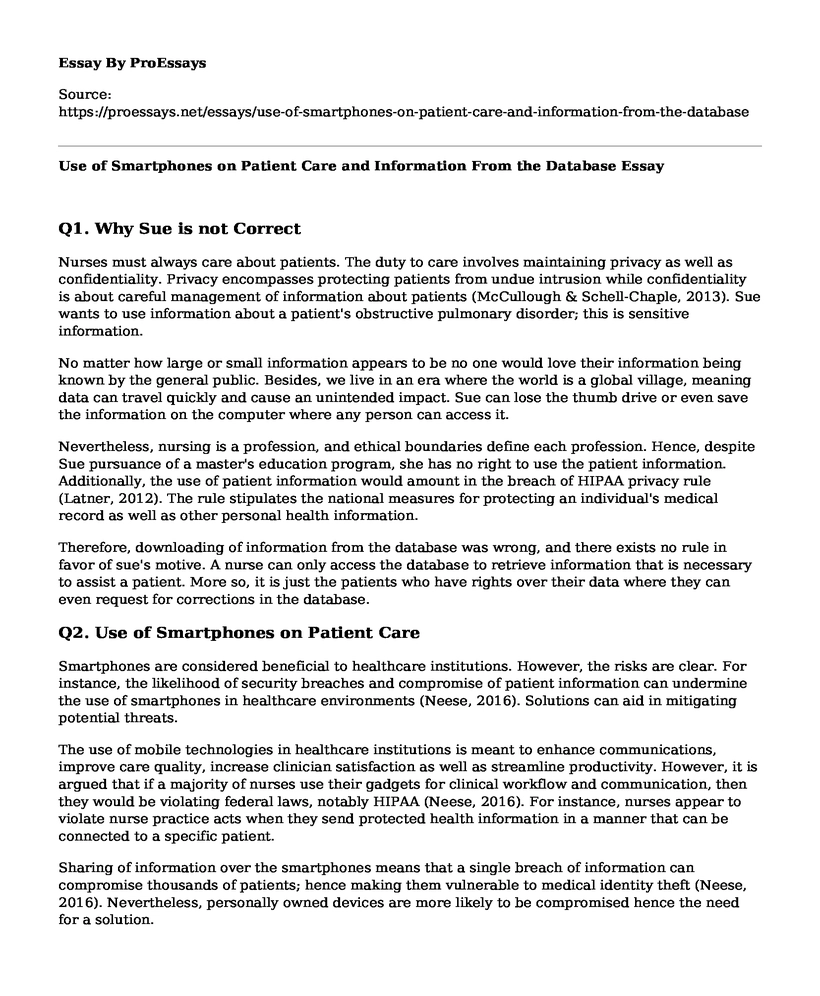Q1. Why Sue is not Correct
Nurses must always care about patients. The duty to care involves maintaining privacy as well as confidentiality. Privacy encompasses protecting patients from undue intrusion while confidentiality is about careful management of information about patients (McCullough & Schell-Chaple, 2013). Sue wants to use information about a patient's obstructive pulmonary disorder; this is sensitive information.
No matter how large or small information appears to be no one would love their information being known by the general public. Besides, we live in an era where the world is a global village, meaning data can travel quickly and cause an unintended impact. Sue can lose the thumb drive or even save the information on the computer where any person can access it.
Nevertheless, nursing is a profession, and ethical boundaries define each profession. Hence, despite Sue pursuance of a master's education program, she has no right to use the patient information. Additionally, the use of patient information would amount in the breach of HIPAA privacy rule (Latner, 2012). The rule stipulates the national measures for protecting an individual's medical record as well as other personal health information.
Therefore, downloading of information from the database was wrong, and there exists no rule in favor of sue's motive. A nurse can only access the database to retrieve information that is necessary to assist a patient. More so, it is just the patients who have rights over their data where they can even request for corrections in the database.
Q2. Use of Smartphones on Patient Care
Smartphones are considered beneficial to healthcare institutions. However, the risks are clear. For instance, the likelihood of security breaches and compromise of patient information can undermine the use of smartphones in healthcare environments (Neese, 2016). Solutions can aid in mitigating potential threats.
The use of mobile technologies in healthcare institutions is meant to enhance communications, improve care quality, increase clinician satisfaction as well as streamline productivity. However, it is argued that if a majority of nurses use their gadgets for clinical workflow and communication, then they would be violating federal laws, notably HIPAA (Neese, 2016). For instance, nurses appear to violate nurse practice acts when they send protected health information in a manner that can be connected to a specific patient.
Sharing of information over the smartphones means that a single breach of information can compromise thousands of patients; hence making them vulnerable to medical identity theft (Neese, 2016). Nevertheless, personally owned devices are more likely to be compromised hence the need for a solution.
To secure patient medical information, nurses need to follow specific rules and guidelines for confiscating their gadgets in the event of a breach. These restrictions should be strictly followed. Alternatively, strong passwords should be encouraged as well as the use of multiple levels of authentication (Neese, 2016). Nurses should install mobile security on their smartphones to avoid breaches.
Also, nurses should not use unencrypted mobile applications or browse in unsecured wireless networks. Instead, they should always use encrypted systems, which have firewalls and passwords. On the other hand, the use of smartphones on patient care should be based on state and federal regulations; this would discourage the exchange of information. Lastly, the institution should employ cybersecurity and legal professionals who would assist in providing review and accountability (Neese, 2016). Ethical and clinical implications on the usage of smartphones can present challenges to nurses and other healthcare professionals.
References
Latner, A. W. (2012, August 8). No exception to HIPAA privacy rules, nurse learns. Retrieved from Renal and Urology News: https://www.renalandurologynews.com/legal-issues-in-medicine/nurse-hipaa-privacy-rules-no-exceptions/article/253828/
McCullough, J., & Schell-Chaple, H. (2013, October). Critical Care Nurse. Retrieved from Maintaining patient's privacy and confidentiality with family communications in the intensive care unit: http://ccn.aacnjournals.org/content/33/5/77
Neese, B. (2016, March 25). Ethical issues in nursing: The impact of smartphones on patient care. Retrieved from Alvernia University: https://online.alvernia.edu/ethical-issues-nursing/
Cite this page
Use of Smartphones on Patient Care and Information From the Database. (2022, Aug 23). Retrieved from https://proessays.net/essays/use-of-smartphones-on-patient-care-and-information-from-the-database
If you are the original author of this essay and no longer wish to have it published on the ProEssays website, please click below to request its removal:
- Studying the Effects of Energy Drinks
- Paper Example on Child Development
- Essay on Organizational Culture & Corporate Strategy: ACADIA Pharmaceuticals Case Study
- Research Paper on Euthanasia: An Ethical Issue that Divides Societies
- Understanding Learning Disabilities: Types, Causes & Impact - Research Paper
- Renewable Energy: A Necessary Resource for Sustainability - Essay Sample
- ERP System: Streamlining Quality Care & Cost Reduction in Cancer Hospital - Essay Sample







